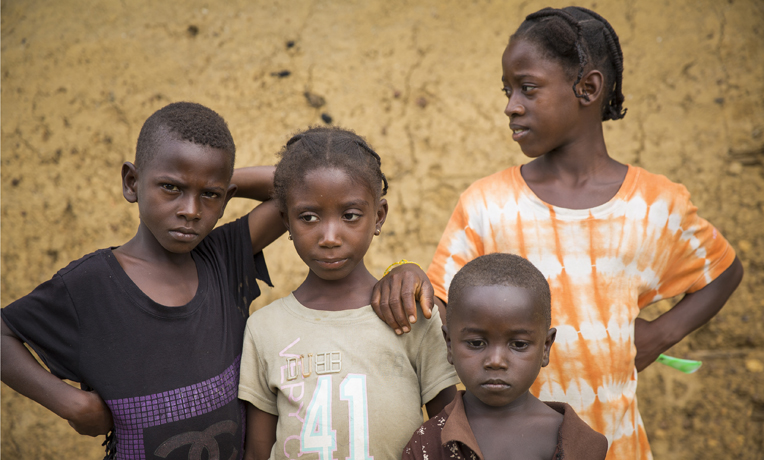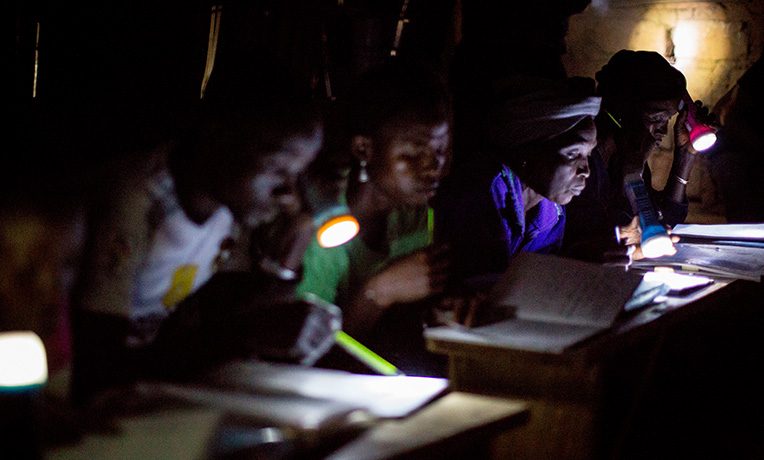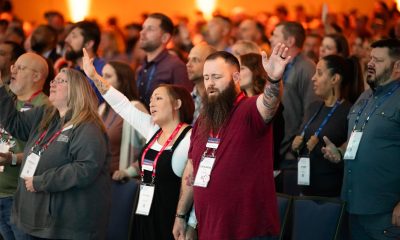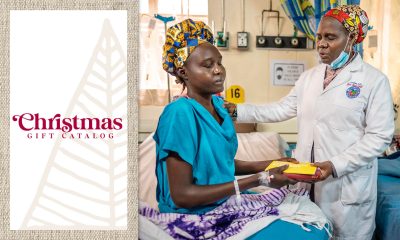One night recently I jumped into our Toyota Land Cruiser, one of the few vehicles that can handle the roads here with relative ease, and joined our community literacy team to visit a beginner class in Sundorkorlor, Lofa County.
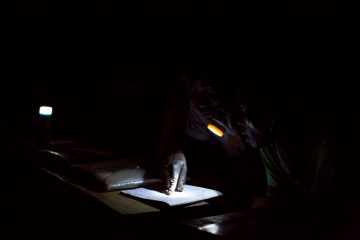
A power outage didn’t stop students from meeting.
After a 45-minute drive over very rough and ragged terrain, we finally pulled up to the little town hall where the class was being held. Because we work in such rural communities where there is no electricity or running water, it’s always obvious where the class is being held, because it’s the only brightly-lit building in the community. In Sundorkorlor they use a generator provided by Samaritan’s Purse.
Most students are subsistence farmers who spend their days working hard in the fields, miles away from the village. Evenings are the only time they can attend class without interrupting their valuable working hours.
The illiteracy rate is incredibly high in rural Liberia, as high as 95-98% in the counties we serve, but people are desperate to learn.
As we approached, I could only see a faint glow coming from inside. I noticed that the familiar hum of the generator was missing. Strange. Silence.
The illiteracy rate is incredibly high in rural Liberia, as high as 95-98% in the counties we serve, but the people are desperate to learn.
But we walked inside and were greeted by dozens of eager students seated around the room, which was dimly lit by a few flashlights. Our facilitator profusely apologized. He could not believe we had come all this way to a classroom with no power because, for no apparent reason, neither of the two generators would power the lights. Our team quickly went to work troubleshooting the problem.
As they scrambled to bring on the power and lights, I introduced myself to each participant, using my phone’s flashlight to read their name on their notebook page. “My name is Finda Tamba. I am going to school in my town.”
This simple phrase was written in a child’s handwriting, but these farm-hardened men and women had more years and experience than I did. Oh, the joy in my heart as each participant proudly showed how they could write their names after many years of being denied a basic education. The median age of the class was well over 50 years—more than five decades without an education or the empowerment that comes with it.
Truth Shines in Fading Light
After these introductions there was still no power and it was clear there’d be no lights for the literacy class. “Since there is no power tonight, we will not have our literacy lesson,” the facilitator told us. “So we will go through our normal Bible discussion.”
By the light of fading flashlights and the light on my cell phone propped in the rafters, the grouped talked about marriage, submission to each other, and respecting and honoring your spouse and what that practically looks like in daily life. As the flashlight batteries ran low, the discussions continued in the dark.

Learning to read and write has empowered people to pursue better futures.
Toward the end I addressed the group and I was honored to be in front of a literacy class again. Literacy training was the first program I managed back in 2009. I told this class it was never too late to learn. I had seen many men and women their age achieve so much through these classes. I also told them why we have literacy programs—so they can read God’s Word for themselves.
Using the darkness of the classroom as an example, I shared how Jesus is the Light of the world. It is His Word that brings light to our paths and His Word that helps us know which direction to walk. We want these classes to lead students toward knowing Jesus Christ as their Lord and Savior.
Program participants were excited to share how their literacy knowledge has already improved their lives. “I never knew how to write my name before,” said one student. “I never knew numbers … but now I can write my name. I can write numbers 1-100 and can write my ABCs.”
One participant, a midwife in the community, had recently gone to the hospital to register a patient. The man at registration grabbed her finger to place it in the ink as usual. She pulled back and said, “I can sign my name now.” The registrar was astonished that this woman could sign her name.
Reading, Writing, and New Life in Christ
The facilitator posed one more question to the group:
“We have shared about how the literacy aspect has made a difference in your life, but what about the Bible discussions? Is there anyone who wants to share if they have impacted your life?”
Two students explained that they finally knew what it meant to forgive each other, which had seemed impossible before the Bible discussions. They had walked away from church, but now attend every Sunday.

By flashlight and light from Joni’s cell phone, students shared how the class has helped them and how God has changed their lives through the class.
An older man, probably in his early 60s, stood up and said: “Yes, these Bible discussions are very important. You see, I am a Muslim man. But through these discussions and what I am learning about God, His love, and how He wants us to live, I have decided I want to leave the Muslim side and I want to become a Christian.”
The room echoed with “Praise God!” The class facilitator was the most excited as he had been discussing this decision for months with this man.
Then, the most beautiful thing happened. Our community development staff, who live full-time in the areas where we work, expressed their delight about his decision. They offered to discuss his questions about what it means to follow Christ. The local pastor, also in the literacy class, agreed to work alongside our staff to strengthen and encourage this man in his new faith.
I was thankful that the lights didn’t come on because my tears were starting to flow. What had just happened was why we brave the rains, the roads, and the many challenges that face us each day in Liberia. It is all for beautiful, tender moments like this.
As a field office in Liberia, everything we do is aimed at fulfilling our vision statement: Our vision is transformed lives through the Gospel, a strengthened church through partnership, and improved communities through our work.
What a blessing to see this vision come to life that night in Sundorkorlor!
We still don’t know why both generators failed that night except that the Lord wanted to give this man a chance to proclaim his new faith in front of his community. I can always say now that as we sat in a dark Liberian town one night, I got to see this man brought from darkness into the light.
